The Barcelonaβeta Brain Research Center
The Barcelonaβeta Brain Research Center (BBRC) is the research center of the Pasqual Maragall Foundation. Since its creation in 2012, it has been committed to research into the prevention of Alzheimer's disease and the study of cognitive functions affected in healthy and pathological aging. The aim of the center is to contribute to the forefront of research on Alzheimer's and neurodegenerative diseases through the unique impact on prevention and treatment, always taking into consideration the social aspects of the disease.
Research
The research of the BBRC focuses on the preclinical phase of Alzheimer's disease, a period prior to the appearance of the first symptoms, when changes in the brain associated with the disease are already occurring. The main objective is to better understand the different processes of Alzheimer's disease in order to detect it early and design prevention programs that delay or stop the onset of symptoms. For this reason, the BBRC extracts most of the data used in the research from the Alfa study, a research infrastructure composed of a cohort of almost 3,000 individuals without cognitive impairment, aged between 45 and 75 years, most of them first-degree descendants of people with Alzheimer's disease.
The input from the Alfa study participants allows researchers to detect biomarkers that may be related to the preclinical phase of Alzheimer's disease, whose origin may begin up to 20 years before the onset of clinical symptoms. This early information is key to preventing cognitive decline and gaining a multidisciplinary understanding of the aging process and the pathophysiology of neurodegeneration. Apart from the Alfa study, the BBRC has several cohort studies, such as Beta-AARC, and participates in international research consortia together with other research centers, universities, and institutions.
The research is organized into five highly collaborative research groups: the Clinical and Risk Factors for Neurodegenerative Diseases Research Group, the Neuroimaging Research Group, the Biomarkers in Fluids and Translational Neurology Research Group, and the Genomics Research Group. These five groups are formed by multidisciplinary teams of clinicians and researchers with extensive experience in Alzheimer's disease pathophysiology, genetics, data processing and analysis, fluid biomarkers, cognition, neurochemistry, and neuroimaging.
The BBRC currently has almost 100 research and support staff. In October 2020, the center received the HR Excellence in Research award (HRS4R), awarded by the European Commission.
Facilities
The center has four research facilities, the Data Center, the Research Management Office, the Neuroimaging Platform, and the Fluid Biomarkers Platform, dedicated to enhancing efficiency in the collection and exploitation of data for research projects, and ensuring the incorporation of new technologies from the field of Alzheimer's and other neurodegenerative diseases research.
The BBRC and Pasqual Maragall Foundation headquarters, inaugurated in 2016, has the most advanced facilities for Alzheimer's research, including a state-of-the-art 3TMR MRI, a laboratory of fluid biomarkers equipped with the most advanced technologies in Europe, and also spaces for conducting phase II, III and IV clinical trials and pharmacokinetic and pharmacodynamic studies, among others.
A center in a privileged environment
The BBRC shares its headquarters with the Pasqual Maragall Foundation on the Ciutadella campus of the Pompeu Fabra University (UPF), just 700 meters from the Barcelona Biomedical Research Park (PRBB), which brings together 1,700 residents, including 752 researchers, from 60 different countries, and houses seven other biomedical research institutions from various disciplines, including the Hospital del Mar Research Institute, the Center for Genomic Regulation (CRG), and the Barcelona Institute for Global Health (ISGlobal), among others.











